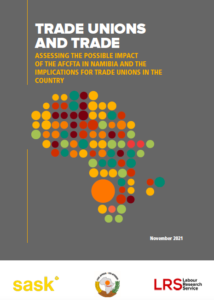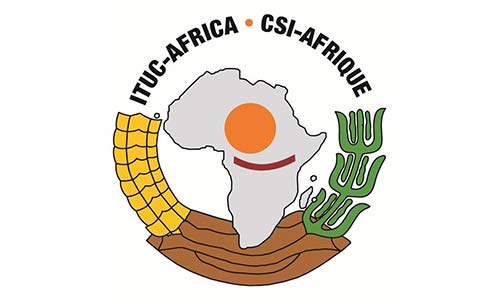The African Continental Free Trade Area (AfCFTA) presents an investment opportunity that Namibia should harness. It has the potential to open new markets for the country’s goods and services internationally while creating jobs at home. As Namibia continues to negotiate with party-states, internationally recognised fundamentals of decent work should become an inherent part of the AfCFTA agreement for everyone’s benefit. The government, trade unions and employers can work together toward a win-win situation and ensure sustainable development as Namibia opens up to the continent.
Status of AfCFTA protocols
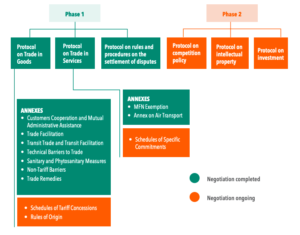
Source: Trade Centre (2021)
Here are the key findings of our new study that looked into the possible impact of the AfCFTA in Namibia and the implications for trade unions there.
1. Trade balance and implications
Macroeconomic data on international trade reveal persistent trade deficits for the past decade (2010-2020). This is mainly due to importing of high valued manufactured commodities and machinery while exporting mostly low valued primary goods. Before the implementation of the AfCFTA, Namibia’s main market for imports and exports was historically within the SADC region, and mainly dominated by South Africa. Namibia could widen its market share for both imports and exports through the AfCFTA. Also, the mining, agriculture and fisheries sectors have the opportunity of benefitting from value addition. Concerninng imports, the Growth at Home strategy could benefit from substituting imports for domestically produced goods.
Export destinations by trading block for Namibia – 2019
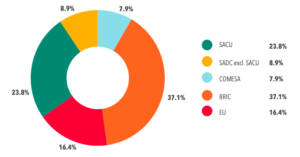
Namibia Statistics Agency, 2020
2. Anticipated impacts on labour and employment
The AfCFTA can impact employment and labour in two aspects. Firstly, job creation could happen through an increase in value chains, which may lead to an increase in jobs through capital flows in trade and investments. Secondly, trade liberalisation opens up Namibia to a bigger market for selling its products and resources. The aspects speak to the possible positive impacts of AfCFTA, which is recognised by various actors such as trade unions and informal sector organisations.
On the flip side, there is potential to impact jobs. An open economy could mean a loss of diversity, which may present job losses primarily in infant industries. Trade unions in Namibia view the current AfCFTA negotiations more as a threat than an opportunity. Unions have criticised the broad scope of the AfCFTA negotiations taken by Namibia, albeit without being informed by labour vulnerability and resilience assessment. However, a deeper understanding is required to identify the multidimensional effects of free trade. Past experiences of investments in Namibia points to unfavourable free trade agreements, particularly for unskilled workers, women, the informal sector, and sustainability.
3. Integrating labour issues in trade negotiation
Our study indicates that social dimensions, which have become a part of trade negotiation, are not explicit in the first phase of AfCFTA negotiations. Namibia has ratified the AfCFTA and is committed to its implementation in selected industries. Trade unions want labour to be integrated into any trade negotiations. Trade unions emphasise that labour and trade are inseparable. We cannot speak of trade without talking of labour. Therefore, an inclusive dimension is urgently needed to have the voice of trade unions and workers represented. Trade unions have demonstrated the willingness to participate in trade negotiations – and directly channel employment and labour issues that can be identified at the very beginning. The two avenues available for participation are the national entities or regional partners.
“Namibia has a trade forum. We would love to be invited to participate… Let’s learn from RAMATEX in the past trade negotiations if government goes alone it leads to failure.” ~ Trade Union Congress of Namibia (TUCNA)
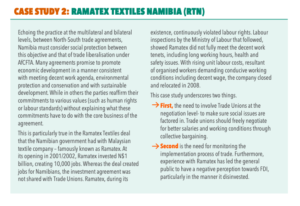
What unions can do
Trade unions can propose several positions at the negotiation table. Unions must address the free trade and investment regime as a whole. This means not tackling its parts in isolation but building a strategy that fundamentally challenges the regime and the corporate interests that lie behind it. Here are some proposals that trade unions can demand:
- Tripartism in the negotiation phases: In analogy to the already existing Trade Forum, Trade Unions Congrees of Namibia (TUCNA) calls for the establishment of a formal permanent working group that would directly allow tripartism.
- Improved consultation process: This will ensure transparency and guarantee that labour issues are on the negotiations table.
- Better assessment of impacts: In the light of the potential negative impact of the past and current negotiation framework, trade unions should push urgently for a broad assessment of the impact of liberalisation policies, for example, impacts on jobs in the prioritised goods and services industries.
- Just Transition: Considering change is inevitable and that Namibia cannot be completely insulated from regional trade and investment agreements, there is a need to identify options that would enhance and empower workers that will be disadvantaged by emerging joblessness.
- Sustainability and regional trade and investment agreements (RTIA): trade unions should demand a clear framework for conducting environmental assessments of trade negotiations.
- Emergency safeguards: TUCNA demands more regulations that allow safeguarding against non-compliance with free trade rules. More exception clauses have to be formulated. The free trade principles need to respect the protection of human rights, the environment, health and safety and the right to sustainable development that decreases the disparities within countries and between countries.
- Strengthening the regulatory powers: The Ministry of Labour, and other oversight bodies such as Environmental Monitoring Boards, Competition Board, National Standards board, among others, should be allowed to perform their mandate without interference.
- Excluding Public Services: Certain public services are better serviced under the ambit of government. These should be service exemptions.
View the full report: Trade Unions and Trade: Assesing the possible impact of the AfCFTA in Namibia and the implications for trade unions in the country

